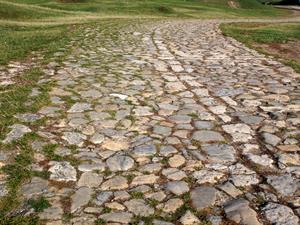
PUMPA - SMART LEARNING
எங்கள் ஆசிரியர்களுடன் 1-ஆன்-1 ஆலோசனை நேரத்தைப் பெறுங்கள். டாப்பர் ஆவதற்கு நாங்கள் பயிற்சி அளிப்போம்
Book Free DemoThe poem begins with the speaker desperately calling for help. It is evident that he has acquired all the skills needed for a person to gain employment. He is seen to be making an appeal to society in general to hire him. He does not specify what job he prefers, as he is looking out for making a living and does not mind the nature of the job. This shows him as a person who is looking to stand on his own legs. He is more keen to get the job and therefore does not quote or specify what he is expecting in return for his service. He does not go in search of job, but is expecting people who are in need of his service to come and hire him. When he makes this appeal, it is morning, a time for new beginnings and hope.

Stone-paved road
He keeps walking on a stone-paved road, signifying the hard and rough patch that he is going through in his own life at that time. Hearing his plea, the first person to approach is the most powerful person, the king. The king is mostly the deciding authority of the place and his word is the final statement when it comes to political affairs. In order to emphasise on the power of the king, the poet states that he arrives with a sword in hand. A sword is the symbol of power and violence. The king has the authority to take the head of someone who disobeys him. He also comes in a chariot, which again stresses more on his power.

The king comes in a chariot
The king, as expected, claims that he could hire the speaker with his power. He exerts his authority to hire the speaker. The speaker denies his offer in spite of the fact that the king is the most powerful person. He says that the king's power amounts to nothing. It did not matter to him, nor did it make a difference. The poet says that when one tries to sell his skill for power, he becomes a slave. He gives the authority to taunt and control him to another person with power. No kind of work can justify this act. The king, therefore, had to leave in his chariot, as his power could not buy the speaker.
Having rejected the king's offer, the speaker moves on with the hope of being hired by someone. The pursuit of employment started off in the morning. But the day has soon transformed into noon, thereby making the speaker more tired. The houses in the lane are all seen with shut doors. This may also signify that his opportunity of being hired is low at this point of time. Any person in his situation would agree to the immediate job proposal that is made. But the speaker was sure that he would only agree to the deserving one. So he keeps walking. Earlier, he was walking on the stone paved road, but now his path is a crooked lane. The effect of job offers keep changing as he rejects them.

The doors of the houses were shut
As he walks along a crooked lane, he is confronted with another job offer. This time it is from an old man. The old man does not offer power like the king as he is not capable of it, being a normal old citizen. But having worked for a long time and saving up the money, he seems to be rich enough to hire the speaker. He comes out with a bag of gold to quote a price for the speaker. He even makes a statement that he can hire the speaker with money. He then starts weighing and counting the gold coins one by one, showing how he is attached to them.

The old man had a bag of gold
The old man signifies the arrogance that one may have when one has money. Most people think that they can buy anything with money. However, this may not be the truth always. The speaker rejects the old man's offer as he is aware that he may not experience any kind of freedom if he has to work for someone like the old man, who values money more than human values.
The speaker, having rejected the job offer of the king and old man, walks on in pursuit of a person who could hire him. The rejection of the king and the old man already signifies that he had rejected power and money, the two things that most human beings consider as an important part of their life. But by the time he does this, it is already evening. Any person who is desperate to get a job would pounce upon the next opportunity that comes across him. But the speaker is determined to get a job that allows him to enjoy the freedom that he wants.
It was evening and the speaker keeps walking until he reaches a garden. From a path of stones, he earlier reached a crooked lane, and then he reaches a beautiful garden, which shows that he keeps progressing and moving into better prospects of getting hired. The garden hedge was filled with flowers. The hedge, which acts as a boundary, is already filled with flowers, which is similar to the speaker establishing his mind regarding boundaries. From the beautiful garden emerges a very fair girl, who also liked to hire the speaker. She says that she would hire him with her beautiful smile. After power and money, people value beauty. The speaker's third test with beauty also yields success as he very confidently rejects it.

Garden with hedges
The maiden's smile soon becomes pale and melts away as she slowly walks into the darkness to fade away. This signifies that the idea of beauty in the minds of human beings is flawed. The idea of a fair skinned girl with long hair, beautiful eyes and very slim is etched in our minds. But once we fathom this idea of beauty and accept that people of all colours and weight are beautiful, we might fathom into looking at it as a non-asset. Until then, the poet seems to emphasise that external accepted beauty may fade away. It is temporary and is not worth for the speaker to get himself hired.

Beauty does not have set standards and is temporary
The speaker had by far rejected power, money and beauty, thereby showing that he was not interested in the materialistic things of the world. He wanted to be hired by someone who could offer something invaluable to him. He walked along searching to strike such a bargain. In the previous stanzas, he searches for a job for almost a day. When he rejects the fair maiden, it is almost night. But he does not lose hope and continues his pursuit the next day. This shows that one must continue to seek what one wants, irrespective of what the situation is.
The next morning, the sun shines brightly, that its rays are reflected on the sand. The speaker seems to be walking near a beach, as the sun's light makes the sand glisten. The sea has waves that were difficult to be controlled, indicating that it was not a calm day. The state of unrest in the mind of the speaker is depicted here. As he walks along, he sees a child sitting by the beach. The child seems to be unperturbed by the sea or the surroundings. He sits there playing with the shells of the beach, enjoying his own company. He is very simple and does not have any possessions except for the shells. The child seemed to know the speaker already and it appeared as though he was waiting for his arrival.

Beach shells
The child raises his head from what he had been doing and proposes to hire the speaker. Unlike the people who had already made this offer, the child says that he would hire the speaker with literally nothing. Generally, people look for more offers and benefits when they want to be hired. But the speaker immediately agrees and the bargain that was made in the last discourse struck as a fair deal to him, as it made him a free man. More than money, power or beauty, one's work or passion needs to make him free and not bound to materialistic possessions.

The child makes a bargain in the beach